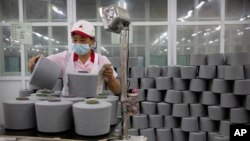The 1830 U.S. law that prohibits the importation of goods made with forced labor was strengthened in 2021 when President Joe Biden signed the Uyghur Forced Labor Prevention Act. The UFLPA bans imports into the United States made by forced labor of products from the Xinjiang Uyghur Autonomous Region.
Thea Lee, U.S. Deputy Labor Undersecretary for International Affairs described that region at a recent congressional hearing:
“Xinjiang is China’s far western region, of course, where hundreds of thousands of Uyghurs, ethnic Kazakhs, Kyrgyz, and members of other persecuted groups are being arbitrarily detained and subjected to forced labor, producing goods that too often enter the U.S. domestic and global supply chains.”
The UNFLPA is implemented through a U.S. government interagency task force that utilizes several tools to counter the importation of goods made with forced labor. Those tools include the development of a list of entities that mine, produce, or manufacture wholly or in part any goods or merchandise produced with forced labor in Xinjiang. Twenty such entities were identified in the inaugural list; the list has now been expanded by 50 percent. The task force also identifies high priorities sectors, such as textiles, tomatoes, and polysilicon, for scrutiny and enforcement.
U.S. Customs and Border Protection, the CBP, is responsible for preventing the entry of products made with forced labor into the U.S. market by investigating allegations of forced labor in supply chains. Eric Choy, Executive Director of CBP’s Trade Remedy Law Enforcement Directorate told Congress that since the UFLPA took effect in June 2022, the CBP has stopped more than 6,000 shipments of goods valued at more than $2 billion dollars for UFLPA enforcement actions.
“The agency is using technology to map supply chains and research high risk commodities to ensure supply chains are free of forced labor inputs.”
Christa Brzozowski, U.S. Acting Assistant Homeland Security Secretary for Trade and Economic Security Policy told Congress that since the implementation of the UFLPA, there is “significant evidence that industry is taking responsibility for understanding their supply chain seriously, including by shifting and diversifying the supply chain.”
The United States, as Secretary of State Antony Blinken has said, remains committed “to combating forced labor everywhere, including in Xinjiang, where genocide and crimes against humanity are ongoing.”














